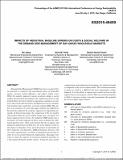Impacts of Industrial Baseline Errors on Costs and Social Welfare in the Demand Side Management of Day-Ahead Wholesale Markets
Author(s)
Jiang, Bo; Farid, Amro M; Youcef-Toumi, Kamal
DownloadImpacts of industrial.pdf (2.128Mb)
PUBLISHER_POLICY
Publisher Policy
Article is made available in accordance with the publisher's policy and may be subject to US copyright law. Please refer to the publisher's site for terms of use.
Terms of use
Metadata
Show full item recordAbstract
Demand Side Management (DSM) has been recognized for its potential to counteract the intermittent nature of renewable energy, increase system efficiency, and reduce system costs. While the popular approach among academia adopts a social welfare maximization formulation, the industrial practice in the United States electricity market compensates customers according to their load reduction from a predefined electricity consumption baseline that would have occurred without DSM. This paper is an extension of a previous paper studying the differences between the industrial & academic approach to dispatching demands. In the previous paper, the comparison of the two models showed that while the social welfare model uses a stochastic net load composed of two terms, the industrial DSM model uses a stochastic net load composed of three terms including the additional baseline term. That work showed that the academic and industrial optimization method have the same dispatch result in the absence of baseline errors given the proper reconciliation of their respective cost functions. DSM participants, however, and very much unfortunately, are likely to manipulate the baseline in order to receive greater financial compensation. This paper now seeks to study the impacts of erroneous industrial baselines in a day-ahead wholesale market context. Using the same system configuration and mathematical formalism, the industrial model is compared to the social welfare model. The erroneous baseline is shown to result in a different and more importantly costlier dispatch. It is also likely to require more control activity in subsequent layers of enterprise control. Thus an erroneous baseline is likely to increase system costs and overestimate the potential for social welfare improvements.
Date issued
2015-06Department
Massachusetts Institute of Technology. Department of Mechanical EngineeringJournal
Volume 2: Photovoltaics; Renewable-Non-Renewable Hybrid Power System; Smart Grid, Micro-Grid Concepts; Energy Storage; Solar Chemistry; Solar Heating and Cooling; Sustainable Cities and Communities, Transportation; Symposium on Integrated/Sustainable Building Equipment and Systems; Thermofluid Analysis of Energy Systems Including Exergy and Thermoeconomics; Wind Energy Systems and Technologies
Publisher
American Society of Mechanical Engineers
Citation
Jiang, Bo, Amro M. Farid, and Kamal Youcef-Toumi. “Impacts of Industrial Baseline Errors on Costs and Social Welfare in the Demand Side Management of Day-Ahead Wholesale Markets.” Volume 2: Photovoltaics; Renewable-Non-Renewable Hybrid Power System; Smart Grid, Micro-Grid Concepts; Energy Storage; Solar Chemistry; Solar Heating and Cooling; Sustainable Cities and Communities, Transportation; Symposium on Integrated/Sustainable Building Equipment and Systems; Thermofluid Analysis of Energy Systems Including Exergy and Thermoeconomics; Wind Energy Systems and Technologies (June 28, 2015). doi:10.1115/es2015-49459.
Version: Final published version
ISBN
978-0-7918-5685-7